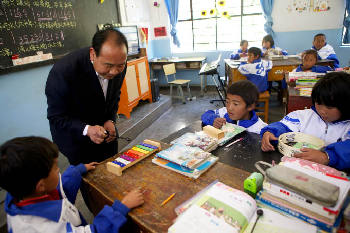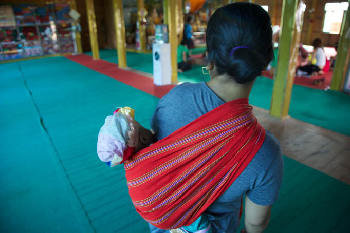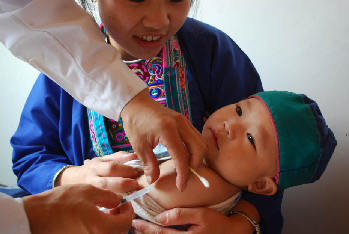For the Welfare of Women and Children
CHINA has 880 million women and children, the largest such group among all countries in the world. To better safeguard their rights and interests, China has carried out extensive cooperation with the UN, and made remarkable achievements as regards eliminating gender discrimination, improving the living conditions of women and children, and protecting their legitimate rights and interests.
|
|
|
A woman in Yunnan Province participates in a project to prevent mother-to-child HIV/AIDS transmission. |
Better Lives
The United Nations International Children’s Emergency Fund (UNICEF), a children’s rights organization, has enjoyed long-term cooperation with China, itself the first Asian country to receive aid from UNICEF in 1947.
Over the 66 years since the founding of the People’s Republic of China, UNICEF and the Chinese government have worked together to improve the lives of the most disadvantaged children, securing Chinese children’s rights to survival, development, protection, and participation in family and social affairs.
In the 1980s UNICEF lent its support to China’s Ministry of Health to institute vaccination’s for children under the age of six. According to Liu Li, communication specialist at the UNICEF China Office, UNICEF helped the ministry build a vaccine storage and transport system – or “cold chain” – as refrigerators were then scarce in China’s remote areas. The network has developed in succeeding years and now extends to 90 percent of China’s population, greatly boosting the national immunization effort and generating marked declines in child premature deaths from measles, polio, tuberculosis, diphtheria, tetanus, and whooping cough. Children in China: An Atlas of Social Indicators 2014, published by UNICEF, shows how China’s national under-five mortality rate (U5MR) declined from 61 per thousand in 1991 to 12 per thousand in 2013. China also realized the 85 percent vaccination coverage scheduling goal and its Millennium Development Goals in advance.
UNICEF has collaborated directly with local governments in impoverished rural areas, including those inhabited by minority groups. Liu Li spoke of UNICEF’s first water and environmental sanitation program in Yunnan Province in 1987, where a lack of clean drinking water raised local child mortality rates. UNICEF built water supply pipelines, rain water cisterns, and sanitary toilets. Within one year, the rate of under-fives suffering from diarrhea fell from 45 percent to 4.5 percent.
In cooperation with the Chinese government, UNICEF promoted the use of iodized salt in the 1990s to prevent iodine deficiency – now over 90 percent of Chinese families keep iodized salt in their kitchens. This is a key achievement in fulfilling the pledges made at the 1990 World Summit for Children.
The Elimination of Maternal and Neonatal Tetanus is a program the WTO, UNICEF and United Nations Population Fund (UNFPA) jointly initiated. In 2012, investigation teams from state parties to the WTO and UNICEF, together with relevant Chinese government agencies, visited 45,088 families. They confirmed the elimination of maternal and neonatal tetanus as a public health issue in China, a milestone achievement in promoting women and children’s health.
According to Liu, over the past 30 years China’s children have been better nourished, and more have had access to health care services. Joint programs of UNICEF and the Chinese government have improved the lives of women and children, including those in remote rural areas, from minority groups, and in migrant worker families.
In 2011 UNICEF and the Chinese government inked the Country Program Action Plan (2011-2015), a five-year plan to improve the lives of China’s women and children. It allocated a fund of about RMB 871 million to aid China’s neediest women and children.
|
|
|
UNICEF lent its support to institute vaccinations for children under six in China. |
Eliminating Gender Discrimination
As a UN organization dedicated to gender equality and women’s empowerment, the focus of UN Women is on ensuring and promoting women’s human rights worldwide. In September 2014, it launched the HeForShe global initiative, and inaugurated its China program in April 2015. A program to realize gender equality throughout society as a whole by encouraging men to participate in eliminating social and cultural barriers, it won the support of millions of men. Rather than diminishing or depriving men of their rights, the movement aims to release women’s potential so that both men and women may contribute to social progress. “This is not a zero-sum game, but one with a win-win outcome,” explained Julie Broussard, country program manager for the UN Women China Office.
“Gender equality not only promotes women’s status and ensures their rights, but also lifts the burden from men’s shoulders – so why not?” said Hou Jieping, a Beijing Foreign Studies University student. He told our reporter the issue matters to him because he has female friends, as well as a mother.
The program’s ambassadors in China – Chinese sports shooter and two-time Olympic winner Yang Ling and actors Wei Zi and Li Guangfu – have staged public appearances urging gender equality.
In 1979 the UN adopted the Convention on the Elimination of All Forms of Discrimination against Women, which came into force in September 1981. The Convention pledges that women shall enjoy equal rights in the fields of politics, economy, society, culture and family life.
As one of the earliest state parties to the Convention, China has filed six national reports to date. In its report submitted in October 2014, China introduced the progress it has made in protecting women’s rights and interests as follows: Improvement of laws and regulations on eliminating gender discrimination and the promotion of gender equality in work and family environments; creation of jobs for women through micro-loans; increases in the percentage of female executives in decision-making and managing businesses and state affairs; improvement of the educational level of women and children; policy support for the development of female professionals; protection of the rights and interests of special groups; guarantees of the medical and health-related rights of elderly women through improved welfare for the elderly; reinforcement of the protection of the rights and interests of disabled women and those in the migrant population via establishment of welfare and insurance systems for special groups; and protection of the personal safety of young girls through formulation of appropriate laws and regulations.
Years of strenuous efforts have yielded significant progress for China’s women. They occupy jobs in more areas and have more diversified career choices. They are in general better educated now, and the gender gap in education at all levels is gradually disappearing. They enjoy better health than ever before, and their life expectancy has reached 77.37 years. Women participate more in decision-making and management, and the percentage of female deputies to the current National People’s Congress grew by 2.07 percent over that of the previous NPC session. Women’s rights also receive effective protection.
 |
|
Pupils in Yunnan Province at a music class. |
Campaign against Domestic Violence
The most common form of human rights violation, violence against women and children is extremely destructive. In China the government and social organizations have begun to assess the negative effects of domestic violence, but finding means to prevent and counter it via law and regulations remains a pressing challenge. The UN Trust Fund to End Violence against Women aims to ensure that more Chinese women have the right to enjoy a life free of domestic violence.
According to Julie Broussard, UN Women hosted a symposium on anti-domestic violence legislation in 2014, inviting experts from around the world to share their experiences with their Chinese colleagues in areas such as legislative procedures and follow-up implementation. The event was warmly welcomed by China’s anti-domestic violence drafting committee, which hoped to draw on the many examples of other countries. UN Women also held a workshop for victims of domestic violence – the first in China – in which representatives of victims, police officers, and medical workers shared their experiences in order to enable social workers to better understand and help victims.
UN Women also cooperates with local governments in an effort to end domestic violence. Broussard said that UN Women, via the UN-sponsored China Gender Fund, assisted the Hunan Provincial Women’s Federation and the Higher People’s Court of Hunan in formulating the Guidelines for Judicial Hearing of Cases Involving Domestic Violence. A first in China, the Guidelines fully consider women’s rights in court proceedings in cases involving domestic violence. They have thus boosted judicial support for gender justice in Chinese society. Based on the Guidelines, UN Women and the Women’s Federation of Hunan Province, the Provincial Department of Public Security, and the Provincial Police Academy jointly drafted the first handbook on police officers’ response to instances of domestic violence. These programs have also added impetus to reforms of relevant policies and laws.
On August 24, 2015, the Law against Domestic Violence (draft) was submitted to the Standing Committee of the National People’s Congress for deliberation. Broussard noted that this draft signals great progress for China after years of hard work by a substantial number of dedicated people.
Preventing the Spread of AIDS among Children
Since China reported its first case of HIV infection, the country has achieved significant progress in curbing the spread of AIDS and caring and providing services for those afflicted. Relevant organizations of the UN, the Chinese government and other partner organizations are joining hands towards more progress.
Liu Li told our reporter that UNICEF is the first international organization to cooperate with the Chinese government on AIDS programs. She said: “As early as 1996 we supported the Chinese government in conducting HIV supervision, care and prevention, community education, and educational activities for young people, and have continued to do so to this day.” Several thousand publicity ambassadors around the nation support UNICEF’s current HIV prevention program for children and youth.
UNICEF is extensively engaged in various programs. They include a pilot children’s welfare service framework, in which community-based social workers maintain records of children afflicted by AIDS and other vulnerable children. It helps them to access social services, cooperate with media to enhance public AIDS knowledge and reduce discrimination against and ostracization of children and families stricken with AIDS. The framework also enables improvement of the system of providing consultation services and social support to help prevent mother-to-child transmission of the HIV virus, and support for the development of the youth ambassador network to facilitate youth participation in HIV-preventive education. “The focus of our work is to narrow the gap and help children secure equal rights,” said Liu. “Protecting children and youth from being infected with HIV/AIDS and providing necessary social services to those already afflicted is key to ensuring these rights,” she added.
In July 2014, UNICEF, the China Health Education Center and the Henan Provincial Government jointly launched the Ai Yi Xing healthcare mobile application in Henan Province. It is a user-friendly smart phone app via which youngsters can access youth-friendly services, including consultation on AIDS and reproductive health issues. The application’s interface is a searchable map offering information on relevant services with feedback options. It also encourages young users to support AIDS prevention and lend help and care to their friends, as well as to participate in volunteer activities. “To protect young people, especially those at high risk, we must provide youth-friendly services covering dropouts, young migrant workers and youth in areas where AIDS is endemic, so that they not only have access to our services but also trust them,” said Liu. “Youngsters, especially the poor or marginalized, are often reluctant to reach out for the help and guidance they truly need because they feel ashamed and discriminated against – this is why we must eliminate stigma and discrimination. We hope that Ai Yi Xing can help them overcome some of these barriers.”
As this mobile application undergoes testing in Henan, the program will also promote the quality of youth-friendly services and hold activities to promote youth participation. As of now, two of Henan’s provincial hospitals have opened youth-friendly outpatient services, with medical staff and volunteers who receive professional training. The youth ambassador network will also expand to buttress AIDS prevention services in pilot districts.
In September 2015, the Chinese government and UN Women jointly hosted the Global Summit of Women at the UN headquarters in New York. The Chinese government supports the UN’s global strategy of advancing women and children’s health, and is proactively accelerating its efforts to meet the Millennium Development Goals in women and children’s health. The main health indicators of China’s women and children are top among developing countries and are narrowing the gap with developed nations. China’s infant mortality rate and under-five mortality rate have already met the Millennium Development Goals.
UN Secretary-General Ban Ki-moon lauded China’s achievements in assuring women and children’s rights to health and provision of equal services, validating China’s active part in the process, and calling upon its government and society to preserve the health of women and children through action. He further voiced his hope that China continues as an instrumental actor championing the health of the Earth’s women and children.


